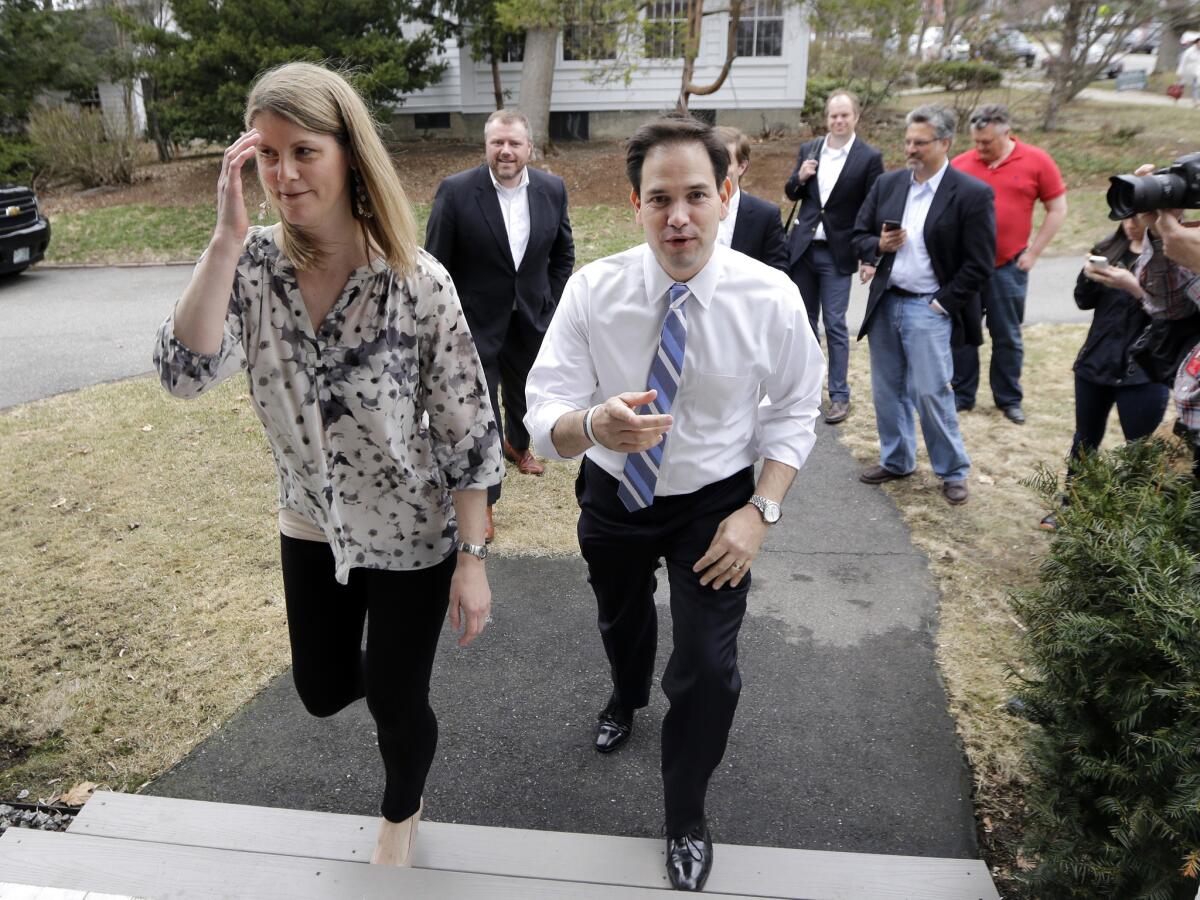Op-Ed: ‘Would you attend a gay wedding?’ -- a question meant to trip up, not inform

A few weeks ago, Jorge Ramos of Fusion asked Sen. Marco Rubio (R-Fla.) if he would attend the gay wedding of a loved one. Rubio responded, “If it’s somebody in my life that I care for, of course I would.” Rubio went on to say that he doesn’t have to agree with someone on every issue in order to attend their wedding.
Ramos started a trend. Within days, dutifully unoriginal political reporters followed suit by asking Scott Walker, Rick Santorum, Rick Perry, Ted Cruz, John Kasich and Jeb Bush the same question. For the most part, presidential hopefuls are answering the gotcha question ably, giving me hope that maybe, just maybe, Republicans are learning how to deal with political reporters interested in tripping them up.
Because that’s exactly the point of a hypothetical question like “would you attend a gay wedding?” — not to illuminate a position but to mock it; not to discover what Republicans really think about a given issue, but to reinforce the narrative that they’re angry, out-of-touch old men.
Katie Packer, the deputy campaign manager for Mitt Romney’s presidential campaign in 2012 and a veteran of dozens of statewide and national political campaigns, thinks reporters are trying to emphasize what they believe to be “ridiculous positions” of Republicans. She says they have “an inability to relate to conservatives on the role of government, the life of the unborn, the 2nd Amendment, to name a few issues.”
In 2012, former Clinton White House staffer turned ABC News anchor George Stephanopoulos asked Mitt Romney, “Do you believe that states have the right to ban contraception?” No U.S. state was considering that step, but Stephanopoulos knew the question would grab headlines.
Of course, hypothetical questions have a long history on the campaign trail, and they haven’t been used exclusively against conservative candidates.
In 1988, Democratic presidential candidate and Massachusetts Gov. Michael Dukakis was asked by CNN’s Bernard Shaw if he would change his stance on the death penalty if his wife “Kitty was raped and murdered.” Shaw was roundly criticized for the tabloid-style question but Dukakis was panned for his robotic answer.
And I do understand why journalists like hypothetical questions, beyond the simple fact that they attract attention and have the potential to make a politician look foolish. Journalists undoubtedly have a duty to push, cajole and aggressively maneuver around campaign handlers in order for the public to see a candidate unscripted. Voters should absolutely know that a future president has the instincts to react to real-life and unrehearsed situations.
A journalist who asks “do you believe the Constitution requires states to allow gay marriage?” gets a ready-made answer. Asking “would you attend a gay wedding?” might provoke a more interesting response.
Still, hypotheticals tend to be silly and reductive; they don’t serve the public. For example, asking candidates how they would have voted on the Iraq war if they had been in the Senate in 2001 does little to educate us on how they would respond to today’s national security threats. The information, circumstances, classified intelligence and amendments offered in 2001 will never be repeated in the same way.
It’s also a problem that the media seems much more interested in throwing exotic questions at Republicans than at Democrats. Democratic candidates usually escape the mainstream media’s gotcha test, and this year is no different. Reporters aren’t hounding the Democratic hopefuls with hypothetical questions on abortion restrictions or gun control and probably never will.
Ultimately it’s up to Republicans to prepare themselves. Packer believes the candidates who get caught off guard are to blame. “They haven’t gamed out the form in which the questions will come,” she says. “Their teams need to do a better job.”
Rubio’s agility is an example for other Republicans. He was able to show compassion by turning around a hostile question. While the gay left and their media allies won’t be happy with Rubio’s response, voters across the country will relate to his comments and agree with him: You don’t have to share the groom’s views in order to attend his wedding. Heck, I’ve attended the weddings of liberal Democrats. I’ve even stood as a witness in one such event.
Richard Grenell was the U.S. spokesman at the United Nations from 2001-2008 and has worked on four Republican presidential campaigns.
Follow the Opinion section on Twitter @latimesopinion and Facebook
More to Read
Start your day right
Sign up for Essential California for news, features and recommendations from the L.A. Times and beyond in your inbox six days a week.
You may occasionally receive promotional content from the Los Angeles Times.






